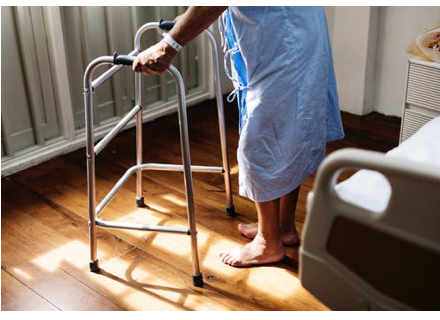The iSavta Team | 19.06.2019

How to be a great caregiver when working with the elderly: Equip yourself with all the right skills, qualities and knowledge, and make sure you look after yourself.
We will also discuss how to look after yourself, as this can often be neglected by caregivers but is just as vital as some of the other skills and qualities you need to have.
Qualities
Patience
Some older people who are less capable of doing things than they used to require patience from their caregiver. The person you’re caring for may be slower at doing certain activities or explaining things, or they may become stressed or frustrated for a number of reasons. Patience is essential as a caregiver.
Compassion and empathy
Older people can often find aging difficult. This is for many reasons, such as a decline in health and capability, loss of friends and siblings, and feeling isolated. Having someone who tries to understand what they’re going through can make the world of difference. As a caregiver, be the best you can be by always trying to put yourself in your client’s shoes.
Companionship
Don’t underestimate the value of your companionship for an elder. As we’ve mentioned, some older people have problems with isolation and need something that we all need – a friend.
Cheerfulness
Some of the tasks that you do as a caregiver may be difficult for the person you’re caring for. Some older adults may feel embarrassed about receiving personal care, and a cheerful demeanor can help to put them at ease.
In my experience, the most successful caregivers have been those who always try to have a smile on their face, no matter how difficult the job can be at times.
Willingness to go above and beyond
Doing things like helping a client to find their favorite flowers to decorate their rooms, or spending extra time talking with them will not only really make a difference in the lives of your clients, but it will also bring more joy to your work. Working as a caregiver can be highly rewarding – you get out what you put into the job.
Skills
Moving and handling skills
Over a third of injuries which happen in the workplace are due to poor moving and handling. Some older people with reduced mobility will need their caregivers to carry out moving and handling for them, such as helping to get them in and out of the car, or on and off the toilet. Sometimes this will involve using specialist equipment, such as a hoist.
If you have to move or lift anyone, ensure you know the right manual handling techniques.
Avoid injury by making sure that you know the proper techniques for manual handling. Try to make sure you have specialist training if you have to do any lifting or manual handling.

High-Speed Training has an online manual for adopting the appropriate techniques. Even if you have already had moving and handling training, be sure to check this out to refresh your memory!
Helping with feeding
Assistance with eating and drinking is often necessary for caregivers, but it can be a delicate task.
Some older people lose their fine motor skills as they get older, or they may have debilitating arthritis or dementia. This means that they may need some assistance with handling utensils or even may need to be hand fed.
Be gentle, give your clients small bites at a time, and alternate between liquid and solid food. Be careful of how you position your clients and beware of the risk of choking.
People with dementia may struggle with too many choices, or they may stop liking food that they had done previously. They may need assistance getting a properly balanced diet, as a poor diet can worsen dementia.
Hygiene and personal care
Helping your clients with hygiene and personal care is a highly important part of caregiving. This is where your qualities of compassion and patience come in, as clients can feel sensitive about their continence issues or need for assistance with bathing.
Senior One has some useful tips on bathing and other aspects of senior care including housekeeping, safety, and medication supervision.
Multi-tasking
Often caregivers will be working alone, so multi-tasking whilst still providing a high standard of care is something that every caregiver must strive for.
Communication skills
One of the most important things is to work on your communication skills. The more you communicate with your clients and colleagues, the more effective you will be as a caregiver. Remember to put the client at the heart of decisions about their care, and if they are able, allow them to make as many decisions for themselves as possible.
Let your clients make decisions about how they want to spend their time.
Observation skills
As a caregiver, it’s vital that you have good observation skills. Good observation skills will help you notice when a client hasn’t taken their medication, or that they are trying to tell you something using their body language.
Knowledge of the aging process
Although you may not have any formal training or certification in working with the elderly, having an understanding of the aging process and some of the difficulties faced by your clients is really important.
Dementia
2% of those between 65 and 69 and 1 in 5 of 85-89-year olds have dementia. Clearly, many jobs working with the elderly involve working with those with dementia. Dementia causes memory problems, mood problems, disorientation, and many other symptoms. It’s vital to familiarise yourself with the symptoms of dementia as a caregiver.
Physical issues
As people age, they are more likely to experience a range of physical conditions. Incidences of diabetes, heart disease and cancer rise with age, as well as age-related conditions such as Parkinson’s, arthritis, hearing loss, and continence issues. Always make sure that you are completely up-to-date on any of the physical conditions that your client might be experiencing.
Mental health problems, grief, and loss
Many older adults suffer from mental health issues, and this can often be seen as part of the natural aging process. However, older adults can live happy and mentally healthy lives. Making sure that you are informed of the specific issues that may affect older adults will help you provide them with the best possible care if they struggle with mental health issues.
Many older adults can experience mental health issues.
Naturally, many older people will lose their spouses, siblings or friends. Their experiences of bereavement can be extremely difficult, and as a caregiver, showing the appropriate empathy and compassion is crucial.
Resources for further learning
The following websites contain details of some training courses available for working with the elderly, many of which are free:
- Carer’s Trust
- Class Central
- Find Courses
- Online Care Courses
- OpenLearn by The Open University
- UCLA also does a series on YouTube for caregivers and is a very useful resource for dealing with a range of issues that we’ve touched on in this article.
- Family Caregiver Alliance also has some really helpful videos you can check out.
Looking after yourself
Working as a caregiver is challenging, and often people are drawn to this job because they are helpful and caring. It’s essential to prioritize your wellbeing when working with the elderly because it can be stressful. Make sure you eat properly, try to set a good sleep routine, exercise, and do what you can to look after your mental health.
Mind has some great tips for looking after yourself.
Summary
Not every single caregiver will have all of these skills, especially at the start of their career. But, if you want to reap the rewards of the job and really provide your clients with the highest quality of life, it is worthwhile identifying your strengths and weaknesses and trying to build up your skills.
Studying for courses, talking with your manager, and getting feedback from your clients can all be helpful ways of learning and boosting your skills.
And remember, take care of yourself too!


